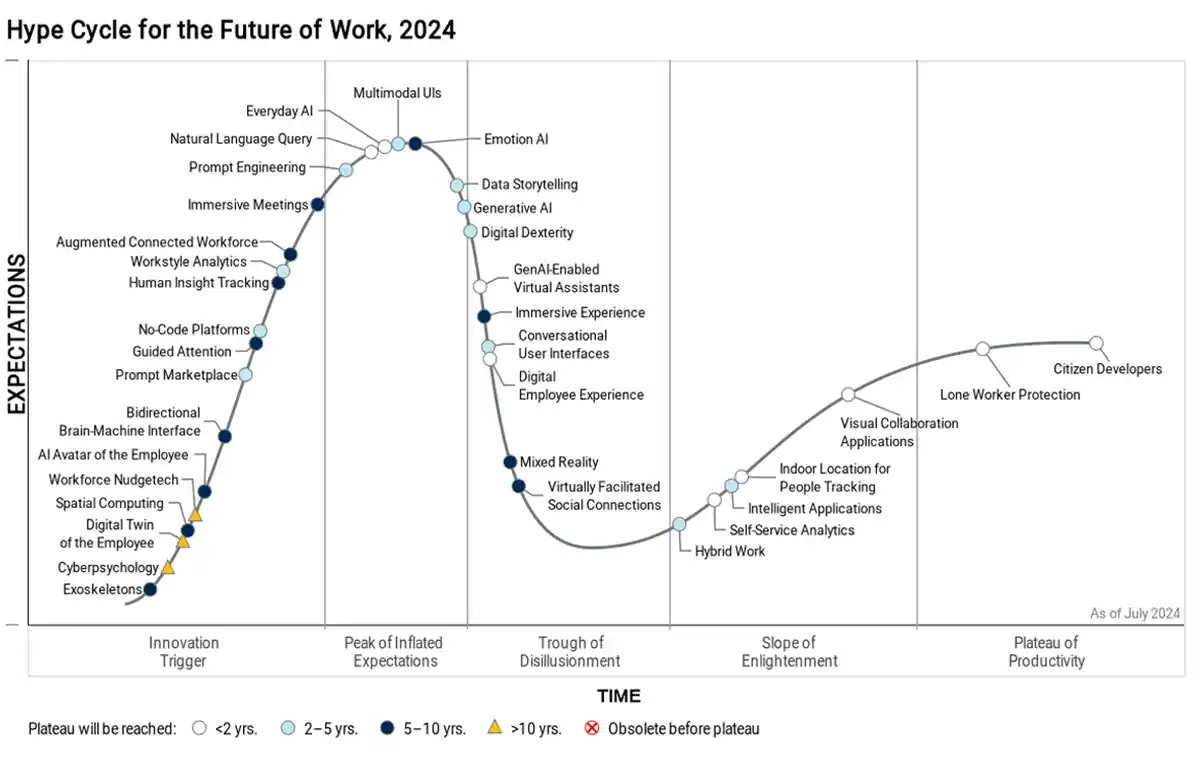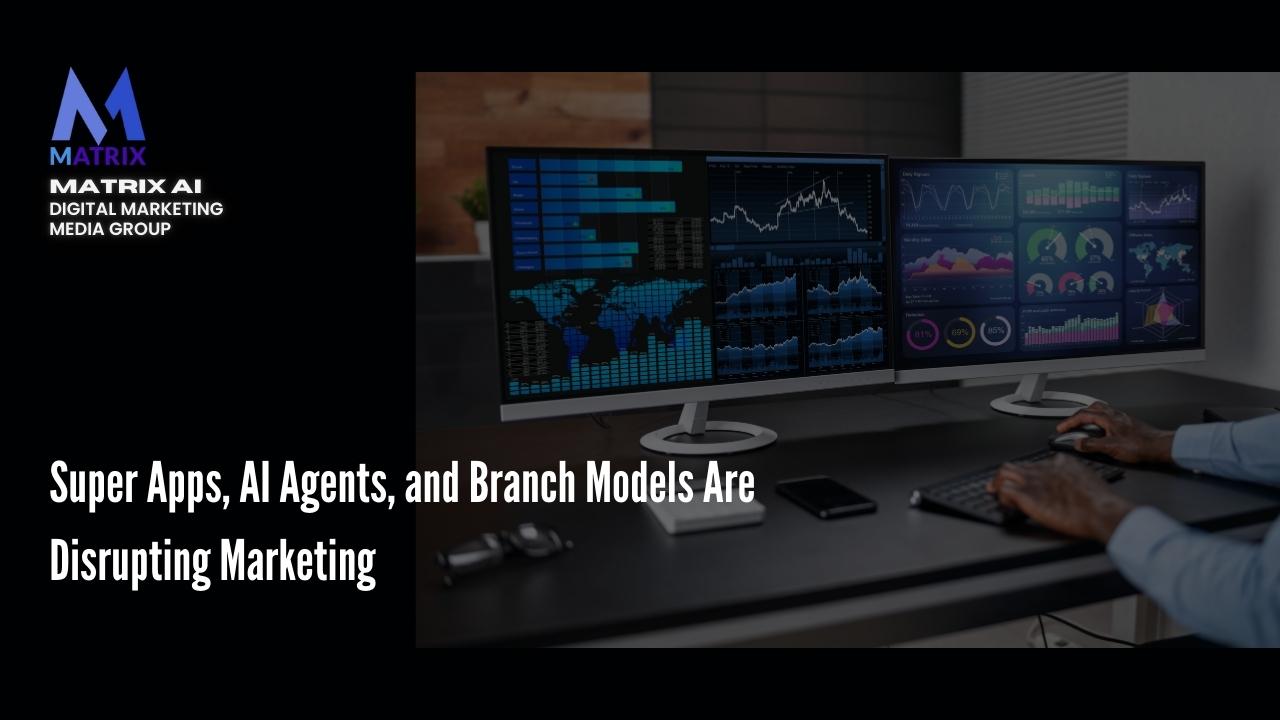MatrixLabX’s Super Apps, AI Agents, and Branch Models Are Disrupting
MatrixLabX is a leader in an ever-evolving marketing technology landscape with Super Apps, AI Agents, and Branch Models.
In the ever-evolving marketing technology landscape, legacy platforms like Salesforce and HubSpot once ruled as the pioneers of customer relationship management (CRM) and marketing automation.
Remember Sebiel Systems? If not, look it up. Or what about roving.com?
For years, businesses relied on these platforms to automate lead nurturing, email marketing, and customer segmentation. However, these systems are increasingly being viewed as too rigid to keep up with the fast-paced demands of modern, AI-driven marketing.
Designed around pre-AI processes, they have struggled to integrate seamlessly with today’s advanced AI capabilities. As a result, businesses dependent on these platforms are feeling the strain, often having to resort to workarounds that stifle innovation and limit real-time marketing agility.
This rigidity in traditional CRM and marketing automation platforms forces companies to bolt on AI as an afterthought rather than embedding it into the core of their marketing strategies. Such a fragmented approach creates operational inefficiencies, data silos, and missed opportunities for hyper-personalization.
By treating AI as a bolt-on solution rather than a foundational layer, businesses are left with a disjointed view of customer data, causing bottlenecks in campaign optimization and overall strategy execution.
MatrixLabX, a leader in advanced AI technologies, proudly announces a groundbreaking collaborative AI framework that leverages AI metacognition, domain-specific agents, and neuro-symbolic reasoning to deliver unprecedented autonomy, adaptability, and intelligence across applications. This innovative system architecture enables AI to operate with enhanced self-awareness, specialized skillsets, and human-like reasoning, marking a significant leap forward in AI functionality for diverse real-world applications.
“At MatrixLabX, we’re pushing the boundaries of AI by creating systems that think about their thinking, operate as specialized experts, and bridge neural and symbolic reasoning,” said George Schildge, CEO of MatrixLabX. “This collaboration allows for a highly adaptive, efficient, and intelligent AI marketing ecosystem capable of handling complex, abstract tasks with human-like flexibility and precision.”
Furthermore, the inability to scale AI-driven initiatives in traditional systems puts businesses at a strategic disadvantage, especially as competitors adopt more flexible, AI-powered solutions.
AI Branch Models for B2B Technology by MatrixLabX
AI-first paradigm rapidly reshapes the industry, replacing outdated structures with agile, efficient, and scalable approaches.
Enter MatrixLabX, whose new Super Apps, AI agents and branch models are shaking up the small and midsize marketing industry.
These cutting-edge tools are built to address the limitations of legacy platforms, offering businesses an integrated, AI-first approach that drives real-time insights, seamless data processing, and a level of flexibility that traditional systems can’t match.
MatrixLabX’s AI-powered Super Apps are designed to unify marketing, sales, and customer service into one cohesive platform. They provide a fully integrated framework that can easily adapt to the demands of modern marketing strategies.
This new paradigm is rapidly transforming the marketing industry, replacing the rigid structures of old systems with a more agile, efficient, and scalable approach.
Limitations of Traditional CRM and Marketing Automation Platforms
Salesforce and HubSpot were once considered groundbreaking, and for good reason—they introduced automation at a time when businesses were desperate for a solution to reduce manual marketing tasks.
However, these platforms were built on a legacy architecture that predates the modern AI revolution. The issue with these older systems lies in their rigidity.
They were designed to handle predefined workflows and rule-based automation, but as marketing has evolved, so have businesses’ needs.
Today, marketing requires dynamic, AI-powered solutions that quickly adapt to customer behavior and market trends.
Relying on traditional platforms that only offer bolt-on AI solutions creates an artificial separation between automation and AI-driven insights.
For example, while Salesforce and HubSpot allow for some level of AI-driven predictive analytics or content personalization, these functions often need to be more cohesive from the broader marketing strategy.
Instead of a seamless, real-time feedback loop, businesses end up with silos of data and insights that don’t effectively communicate with one another.
This fragmentation leads to inefficiencies, campaign execution problems, and missed opportunities for personalization.
Moreover, bolt-on AI solutions expose companies to operational risks. With data flowing through multiple, often incompatible systems, businesses increase the likelihood of data breaches, inaccuracies, and mismanagement.
Maintaining security protocols across disconnected platforms is complex, especially when complying with regulatory standards like GDPR and CCPA.
As AI technology evolves, businesses tied to traditional CRM and marketing automation systems will find it increasingly difficult to stay competitive.
HubSpot Review (Legacy Marketing Automation)

While popular and widely used for marketing, sales, and customer service, HubSpot does have some weaknesses that businesses, especially those looking for more advanced and flexible solutions, should be aware of.
Here are some of HubSpot’s notable limitations:
1. Limited Flexibility and Customization
HubSpot offers a highly user-friendly interface, but this simplicity comes at the cost of customization. The platform is designed to work well out of the box, but it can be rigid for businesses that require deep customization or more complex workflows.
As companies grow or their needs become more specialized, HubSpot’s ability to adapt may be limited, forcing businesses to use workarounds or third-party integrations.
2. Cost Scaling
HubSpot’s pricing model can be attractive to smaller businesses when they first start, but it can become prohibitively expensive as companies scale.
The cost rises significantly as you add more contacts or users or access advanced features (such as custom reporting, predictive lead scoring, or advanced automation).
The price-to-feature ratio can become a major concern for businesses with growing contact lists or complex needs.
3. Lack of Advanced Features for Larger Enterprises
While HubSpot is great for small and mid-sized businesses (SMBs), it lacks many advanced features needed by larger enterprises.
For example, its reporting and analytics tools are limited compared to platforms like Salesforce, which offer more detailed, customizable reports and dashboards.
Larger organizations that require deeper integrations with enterprise resource planning (ERP) systems or advanced sales forecasting may find HubSpot insufficient.
4. Limited AI Integration
While improving, HubSpot’s AI capabilities are still limited compared to competitors offering more advanced AI-driven insights, predictive analytics, and machine learning.
For example, companies looking for advanced personalization, content recommendations, or predictive lead scoring may find that HubSpot’s bolt-on AI solutions do not fully meet their needs. HubSpot’s reliance on integrations for advanced AI functions can create disjointed workflows and data silos.
AIContentPad – On-Brand Content
AIContentPad offers numerous advantages to on-brand content and corporate governance. It enables companies to streamline communication, improve compliance, and support decision-making processes through efficient and reliable content generation.
AIContentPad provides a scalable solution that helps companies uphold and exceed governance standards. This ultimately leads to better decision-making, stronger regulatory compliance, and enhanced organizational accountability.
5. Email and Marketing Automation Limitations
HubSpot’s marketing automation features are highly accessible and intuitive but may lack the depth and complexity some larger businesses need.
For example, the email marketing tool has limitations in terms of customization and dynamic content.
It works well for basic campaigns but may not effectively support advanced workflows or highly segmented, dynamic content strategies as other platforms.
6. Data Migration and Integration Challenges
While HubSpot boasts numerous integrations, transitioning data from other platforms can be difficult and time-consuming.
HubSpot can sometimes struggle with complex data migrations, especially from systems with highly customized fields or specific data structures.
This can cause problems for companies switching from other CRMs or marketing platforms that require extensive historical data to be maintained.
7. Lack of Advanced E-commerce Integration
HubSpot offers some e-commerce integrations, but they may not be as robust as competitors like Shopify or BigCommerce.
Businesses that rely heavily on e-commerce may find HubSpot’s e-commerce functionality somewhat limited, especially when managing complex product inventories, order management, or customer segmentation based on purchasing behavior.
8. Complexity in Scaling with Larger Teams
HubSpot is designed to be intuitive for small teams, but as businesses grow and require more advanced workflows, team permissions, or collaboration features, HubSpot can become cumbersome.
Managing permissions, reporting across multiple teams, or sharing data between departments may not be as seamless as in more enterprise-focused CRM platforms like Salesforce.
9. Support and Onboarding Can Be Expensive
HubSpot offers a wealth of support resources, but dedicated customer support or professional onboarding require an additional cost.
For businesses looking to scale quickly or implement advanced features, the cost of support and onboarding services can add significantly to the overall cost of using the platform.
10. Limits on Reporting Customization
HubSpot’s reporting is often critiqued for its lack of flexibility, especially for companies that need highly customized, granular reporting.
While the platform offers basic reporting features, it may not provide the depth needed for complex businesses requiring specific KPIs, sales performance analysis, or multi-touch attribution models.
More advanced reporting usually requires an additional purchase of higher-tier plans or integration with third-party analytics tools.
Overall, HubSpot is a great tool for small to medium-sized businesses with straightforward needs. Still, as companies scale or their needs become more complex, these limitations may become more pronounced.
Salesforce Review
Salesforce is a powerful and widely used CRM platform with many features, but it also has some notable weaknesses, especially regarding its AI capabilities.
While Salesforce has made significant strides in incorporating AI, particularly with its Einstein AI suite, there are still several limitations that businesses should consider:
1. Complexity in AI Implementation
One of the most significant weaknesses of Salesforce’s AI capabilities is the complexity of setting it up and implementing it effectively.
While Einstein AI offers predictive analytics, personalized recommendations, and automation, configuring these features requires considerable customization and technical knowledge.
Smaller businesses or those without in-house technical teams may find it challenging to fully leverage AI capabilities without expensive consulting services or third-party help.
2. Limited AI Integration Across All Tools
Salesforce has a vast array of products (Sales Cloud, Marketing Cloud, Service Cloud, etc.), but AI integration is not always seamless across all.
While Einstein is embedded in various Salesforce offerings, the AI functionality may be inconsistent or limited depending on which cloud or module a business uses.
For example, some features in Einstein for Sales Cloud, like lead scoring, might not work as well or be as customizable in Marketing Cloud or other Salesforce products.
3. Bolt-On AI Approach
Like HubSpot, Salesforce has a bolt-on AI solution rather than an AI-first architecture. Einstein AI is an add-on that enhances existing features, but it is not deeply embedded into the core of every workflow.
This creates a scenario where AI capabilities are treated as supplementary rather than foundational.
As a result, businesses may not be able to achieve full AI-driven automation and personalization across all their processes, leading to fragmented workflows.
4. High Costs for Advanced AI Features
While Salesforce offers some basic AI functionality out of the box, more advanced AI features typically come with additional costs.
Businesses that want access to the full range of Einstein AI capabilities, such as advanced predictive analytics or deep learning models, may need higher-tier plans or Einstein Analytics licenses, which can become quite expensive.
These additional costs may be prohibitive for smaller companies or those with tight budgets.
5. Data Integration Challenges
Effective AI requires seamless data integration across multiple touchpoints and systems, but Salesforce can struggle.
While it offers many integrations, ensuring that data from various sources is clean, consistent, and available for AI-driven insights can be challenging.
AI models like Einstein require large amounts of high-quality, unified data to perform well. Businesses often find that their data is siloed across different Salesforce products or third-party platforms, limiting the effectiveness of the AI features.
6. AI Is Dependent on Data Quality
Salesforce’s AI capabilities, like those of any machine learning or predictive analytics tool, depend heavily on the quality and quantity of data fed into the system.
If businesses don’t have well-structured, clean data, Einstein AI’s predictions and recommendations may be inaccurate or unreliable.
Unfortunately, Salesforce doesn’t always provide the tools to help businesses clean, normalize, and unify their data easily, making it harder for them to take full advantage of AI insights.
7. Customization Constraints with AI Models
Although Salesforce Einstein allows some level of customization for AI models, the level of customization is still limited compared to other AI solutions in the market.
Businesses with specific AI needs or those wanting to tweak models heavily to suit their unique workflows may find Salesforce’s AI offering too generic.
Companies looking for more control over their AI algorithms, tuning, or the ability to implement custom AI models will find Salesforce’s built-in capabilities lacking compared to specialized AI platforms.
8. Slower AI Evolution Compared to Competitors
While Salesforce has been investing in AI, the pace at which its AI tools are evolving can be slower than newer AI-first platforms.
Competitors that focus entirely on AI-driven marketing and sales automation may offer more cutting-edge features, such as deeper machine-learning capabilities, real-time decision-making, and more personalized customer interactions.
Salesforce’s AI developments may not always keep up with the rapid advancements in AI technology, particularly in fields like natural language processing, image recognition, and autonomous decision-making.
9. Dependence on AI for Customer Interactions
Although AI can greatly enhance customer interactions by automating responses and offering personalized recommendations, businesses risk becoming overly reliant on AI for these functions.
Salesforce’s AI, like any other, can sometimes fail to provide the nuanced human touch needed for certain interactions, particularly in customer service.
If AI is relied upon too heavily, it can lead to a loss of personalization and empathy, negatively affecting customer satisfaction and retention.
10. Limited AI Transparency and Explainability
AI transparency is an ongoing issue with many platforms, including Salesforce. While Einstein AI provides predictive scores and recommendations, it doesn’t always explain how it arrived at those conclusions.
This lack of explainability can make it difficult for marketing and sales teams to trust the AI’s decisions, especially when high-stakes or complex decisions are involved.
Without a deeper understanding of the AI’s inner workings, teams may hesitate to embrace or use its insights effectively and fully.
Salesforce’s AI capabilities are certainly powerful, but they have significant limitations that may prevent businesses from fully realizing their potential.
These weaknesses, from implementation complexity to high costs, data integration challenges, and limited customization, can hinder the effectiveness of Einstein AI.
While Salesforce remains a strong player in the CRM and marketing automation space, businesses that prioritize AI-driven processes may need more flexible, AI-first platforms to achieve the full benefits of AI technology.
Why MatrixLabX’s Super Apps Are the Future

MatrixLabX has taken a radically different approach, integrating AI into the very fabric of its marketing and CRM solutions.
Rather than treating AI as an afterthought, MatrixLabX’s Super Apps are built on AI-first architecture, which allows businesses to operate with greater agility, flexibility, and efficiency.
These AI-driven Super Apps unify data across all customer touchpoints—marketing, sales, and service—eliminating silos and enabling real-time decision-making.
In this new ecosystem, AI agents continuously learn from customer interactions, market trends, and historical data, providing businesses with real-time, context-aware insights.
This level of AI integration is a game-changer for small and midsize businesses (SMBs).
Unlike traditional systems’ rigid workflows, MatrixLabX’s AI agents can predict customer preferences, optimize communication strategies, and automate complex marketing tasks with minimal human intervention.
This gives SMBs a competitive edge, allowing them to execute highly efficient, scalable, personalized campaigns. Additionally, the platform’s ability to learn and adapt to customer behavior in real-time ensures that businesses can stay agile, regardless of market shifts or evolving customer expectations.
MatrixLabX’s Super Apps also address a critical pain point for many SMBs: a cohesive, all-in-one platform. Traditional systems often require companies to juggle multiple tools and platforms, leading to operational inefficiencies and higher costs. With MatrixLabX, everything is integrated into a single, seamless system.
Whether lead generation, customer journey mapping, or post-sale support, businesses can manage it within the same ecosystem, reducing the need for disconnected tools and enabling more effective collaboration across departments.
Breaking Down Silos with AI Agents and Branch Models

Another significant advantage of MatrixLabX’s AI agents is their ability to break down the silos that traditionally exist between marketing, sales, and customer service teams.
In older CRM and marketing automation systems, these departments often operate in isolation, using different tools and workflows that rarely communicate.
This leads to operational inefficiencies, inconsistent customer experiences, and missed opportunities for cross-departmental collaboration.
MatrixLabX solves this problem by integrating every aspect of the customer journey into one unified system. From lead generation and nurturing to post-sale support, AI agents continuously learn from each interaction and adjust in real-time.
This creates a holistic view of the customer, enabling marketing, sales, and service teams to collaborate more effectively and provide a seamless, personalized customer experience. By breaking down these silos, MatrixLabX empowers businesses to be more responsive to customer needs and market opportunities.
Moreover, MatrixLabX’s branch models offer another layer of innovation, allowing businesses to tailor their marketing strategies based on specific customer segments, products, or market conditions.
The branch model framework enables businesses to deploy highly targeted, personalized campaigns across multiple customer segments while maintaining consistency in messaging and branding.
This ensures businesses can deliver the right message to the right audience at the right time, enhancing the overall customer experience.
Hyper-Personalization and the Future of Marketing Automation
Modern marketers’ biggest challenge is the increasing demand for hyper-personalized experiences.
Today’s customers expect brands to know their preferences, anticipate their needs, and deliver personalized content across multiple channels.
Legacy CRM and marketing automation platforms need help to meet these expectations with their predefined wonder help and rule-based automation.
MatrixLabX’s AI agents excel at delivering hyper-personalized experiences at scale. By continuously learning from customer behavior and market trends, AI agents can predict individual preferences, optimize content delivery, and adjust communication strategies in real time.
This enables businesses to create highly personalized customer journeys that are efficient and scalable. Instead of relying on one-size-fits-all automation sequences, businesses can tailor their marketing efforts to each customer, ensuring a more engaging and relevant experience.
As AI continues to evolve, MatrixLabX is well-positioned to lead the future of marketing automation.
The platform’s AI-first architecture, real-time learning capabilities, and seamless integration across business functions make it the ideal solution for SMBs looking to stay competitive in an increasingly AI-driven world.
By adopting MatrixLabX’s Super Apps, businesses can eliminate the rigidity of traditional systems and unlock new levels of agility, precision, and scalability in their marketing efforts.
The Risks of Clinging to Legacy Platforms
Businesses relying on traditional CRM and marketing automation platforms like Salesforce and HubSpot face increasing risks. As AI becomes more central to marketing, the limitations of legacy systems will only become more pronounced.
Businesses that fail to adopt AI-driven solutions like MatrixLabX’s Super Apps risk falling behind their competitors, who are better equipped to leverage real-time data, optimize marketing strategies, and deliver personalized customer experiences.
Moreover, as regulatory requirements around data handling and privacy become more stringent, the operational risks associated with bolt-on AI solutions will increase. Managing security protocols across disconnected systems is complex and leaves businesses vulnerable to data breaches and compliance issues.
MatrixLabX’s unified platform, with its built-in security features and AI-driven compliance tools, offers a more secure and reliable solution for businesses looking to stay ahead of the curve.
A Tailored Approach to Marketing
In today’s dynamic business landscape, a one-size-fits-all approach to marketing doesn’t work. Recognizing this, MatrixLabX and Matrix Marketing Group developed AI Branch Models to provide a flexible and adaptable solution. This framework allows marketing managers to develop customized strategies for different industries and vertical markets, ensuring that marketing efforts are always relevant and targeted.
AI-Powered Tools for Enhanced Efficiency
At the core of AI Branch Models are three powerful AI agents:
- AIProdPad: Streamlines product development and marketing, aligning product lifecycles with specific industry needs.
- AIContentPad: Automates content creation and management, ensuring marketing messages resonate with target audiences.
- AIBrandPad: Develops communication frameworks and aligns corporate governance for consistent brand messaging across all platforms.
These AI-powered tools empower marketing managers to respond quickly to market shifts, adjust strategies in real time, and maintain alignment with broader corporate goals.
Conclusion: The Future Belongs to AI-First Platforms
The marketing industry is at a turning point. Traditional CRM and marketing automation platforms, once the backbone of digital marketing, are no longer enough to meet the demands of today’s AI-driven landscape.
As businesses look to stay competitive in an increasingly dynamic market, the need for more flexible, agile, and scalable solutions has never been more critical.
MatrixLabX’s Super Apps, AI agents, and branch models are leading the charge, offering businesses a fully integrated, AI-first platform that eliminates the rigidity of outdated systems.
With the ability to deliver real-time insights, hyper-personalized experiences, and seamless data integration,
MatrixLabX is revolutionizing how small and midsize businesses approach marketing automation.
Chief marketing officers looking to future-proof their marketing strategies should adopt AI-driven solutions now. The future belongs to those who can adapt, and MatrixLabX is the key to unlocking that future.



